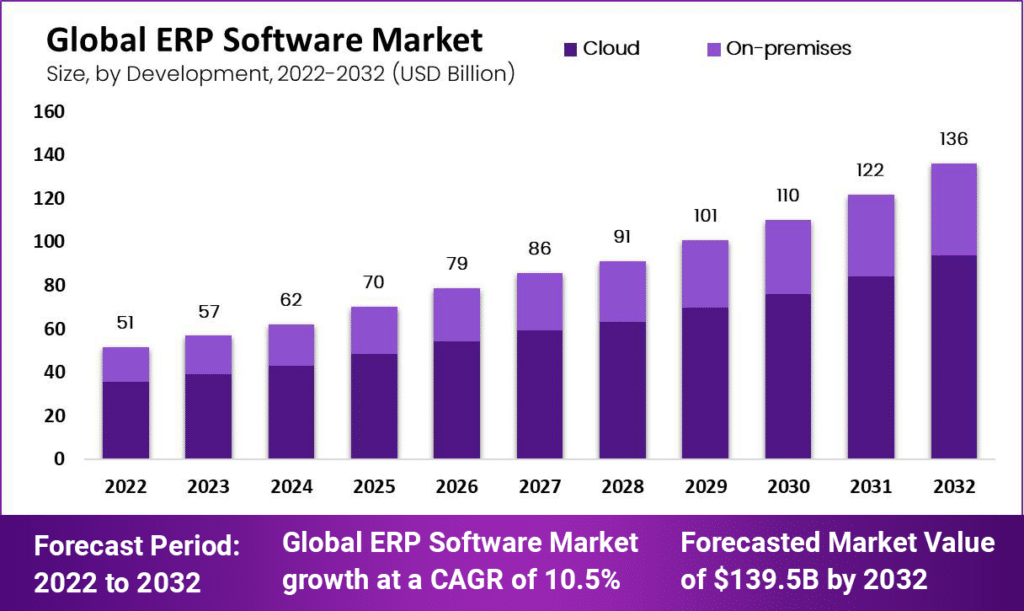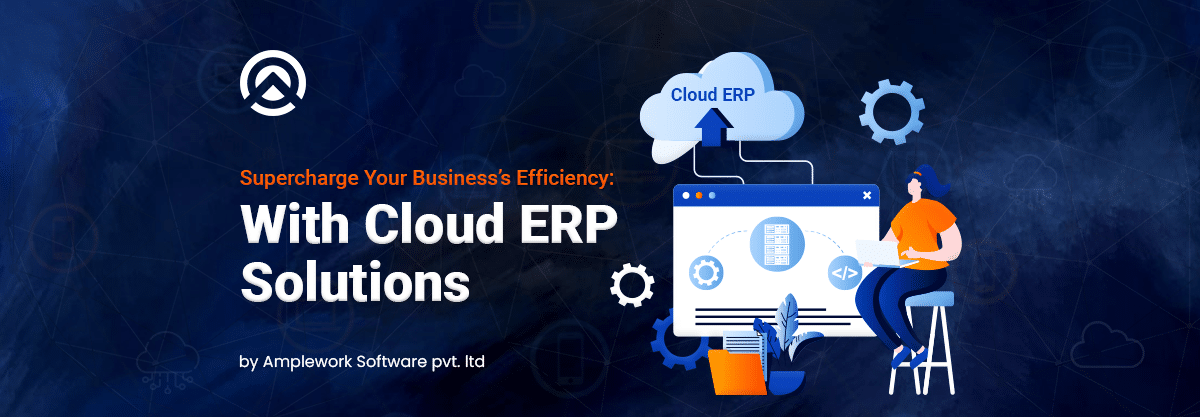On May 16, 2023 – HSA Group (this group is counted among the middle east’s largest family-owned conglomerates) successfully completed digital transformation through SAP cloud based solutions.
Not only this company but there are other organizations as well that tend to adopt cloud-based solutions to enhance their growth. Here, it can be analyzed that ERP software vendors will be going to experience various opportunities in this market due to increasing automation and digital transformation trends.
According to the official of Market.Us – the global ERP Software Market incorporates the potential to reach $139.5 billion by the year 2032. This market will grow at a CAGR of 10.5%. These data showcase the positive trend for the ERP software market & cloud solutions.
 Source: Market.Us
Source: Market.Us
Now, the smartest and most cutting-edge organizations desire to move their on-premise enterprises to the cloud. As this move is capable of generating long-term benefits for the logistics and supply chain operations. Cloud ERPs are enhancing productivity while improving the user experience at the same time.
In this blog, we will cover the discussion related to ways through which cloud-based ERP can enhance your business efficiency.
Overview of Cloud ERP Solutions
In enterprise resource planning (ERP) an organization can effectively commence its day-to-day business operations. For example: ERP software allows companies to operate their functions related to inventory management, human resources, customer relationship management and many more.
Now, the birth of cloud ERP solutions arises when companies begin to face an issue related to managing their ERP data through in-house servers or data centers. To overcome this problem, companies see Cloud ERP as an excellent solution for their issue.
Moreover, the era of automation gives huge support to this business solution. Companies are now able to automate their operations through the proactive system of cloud ERP solutions.
5 Advantages of Cloud ERP Solutions
 Advantages of Cloud ERP Solutions
Advantages of Cloud ERP Solutions
Maintaining its own data centers for ERP as compared to cloud ERP incorporates massive costs. Thus, it is considered one of the smartest moves to integrate cloud computing services. Although, we have searched for 5 potential advantages that businesses can generate through cloud ERP solutions:
1. Cost-saving operations
You can save 30% to 45% on infrastructure costs by moving your ERP systems from data operations to a cloud environment. Apart from this, the overall maintenance and management cost for managing server rooms is much more as compared to cloud solutions. So, you will also be able to save the cost of operations by incorporating cloud solutions.
2. Automatic updates & maintenance
The cloud ERP offers you automatic updates related to settings in the form of “New Instances”. So, as per your requirements, you can disable automatic updates, create new instances, transform existing instances and more. Moreover, you can also opt for continuous product development services (part of the CI/CD pipeline) with cloud business solutions.
3. Data security & reliability
We’re living in the era of big data and companies are generating as well as collecting vast amounts of analytics. This also gives rise to hybrid workforces and traditional network-based perimeters are disappearing at a faster speed.
So, to enhance the customer experience the companies tend to use the latest data security measures for reliable business solutions. For example: global cloud companies establish their separate units for data security & reliability. Such as: AWS Security, Azure Security, SaaS Security, Google Cloud Security and many more.
4. Stay free from the tension of managing servers
Free your existing workforce from managing services and rectifying issues. In such cases, it is a fact that migrating to the cloud can reduce the burden of managing servers. Not only this, you’ll experience ease in infrastructure management, operating systems, resource provisioning, automated services and troubleshooting.
5. Offers Quick Disaster Recovery
Almost all the companies that operate traditional servers tend to face several disasters such as:
- Natural disasters – earthquakes, floods, hurricanes, etc.
- Pandemics & epidemics.
- Cyber Attacks – Malware, ransomware attacks, etc.
- Technological hazards – power outages, pipeline explosions, etc.
- Hardware hazards – machine errors.
Don’t worry because there is an ultimate solution for this problem – switch to Cloud ERP solutions.
 Cloud ERP solutions
Cloud ERP solutions
Here it is important to understand that cloud solutions are not only useful for huge enterprises, but even if you run a startup then still you should give preference to cloud solutions. You can save an ample amount of money by shifting from traditional servers to cloud solutions.
Moreover, you can get better revenue generation opportunities by making use of MVP Development services to test your product, service or idea in real market scenarios.
Read More: Full-Stack Development and the Impact of Cloud Computing
6 Ways to Boost Business Performance with Cloud ERP Systems
There are significant reasons which can boost the entire business performance of your organization if you choose to implement cloud ERP systems. As already discussed, on-site data sets require a significant amount of investment but upgrading your systems with the cloud will be going to help you in saving an ample amount of money.
Now, we have outlined certain measures which will help you to understand cloud ERP systems for boosting your overall business performance:
1. Less Capital Investment
2. Powered By Analytics
3. World-Class Security
4. Faster Implementation & Deployment
5. Get Complete Peace of Mind
6. Helpful in Providing Remote Operations
 Source: KBV Research
Source: KBV Research
After COVID-19, companies tend to offer remote working options to their employees. Even after COVID-19, companies continue to offer remote options to their employees. So, if your company also offers remote employment status then you need to switch towards cloud ERP solutions immediately.
It will also create ease for your employees who are working remotely. For example: suppose your business is still operating with on-premises data sets then you’ll need to maintain a specific maintenance team that should be present in the premises.
However, if your business is incorporating cloud services then you need cloud technicians who can even work remotely to maintain online data sets. In this way, it will create more peace of mind for employees.
So, to turn your idea into reality you need to take cloud computing service. You can hire a cloud development agency for analyzing your business areas that incorporate the potential for cloud computing.
Roadmap to Integrate Current Systems with the Cloud
 Current Systems with the Cloud
Current Systems with the Cloud
Cloud computing companies are eager to offer cloud computing solutions to you. However, many business owners are still unclear about what should be a roadmap to integrate cloud computing systems into their existing business processes?
Thus, to ease your confusion we have decided to present certain steps which will be the essential pillar of your roadmap to integrate existing business systems with cloud solutions:
1. Defining objectives:
First start by defining objectives for integrating current systems with the cloud. Here, you need to emphasize specific goals you want to accomplish. For example: your goal can be related to cost reduction, increased agility, enhanced performance, etc.
2. Assess your existing systems:
Completely evaluate your existing systems, applications and infrastructure. You need to identify key components in any business areas that are suitable for migration to the cloud. It will be better to consider these factors such as: data security, compliance requirements and performance considerations.
3. Select a cloud service provider:
Select a cloud service provider (CSP) that aligns with your business requirements. Here, popular options are as follows – Amazon Web Services (AWS), Microsoft Azure and Google Cloud Platform (GCP).
4. Brainstorm for a migration strategy:
Here, you need to develop a comprehensive migration strategy that effectively outlines the following steps, timelines and resources (that you require for successful migration).
You need to consider whether you’ll adopt a lift-and-shift approach or rebuilding applications is necessary for optimal cloud utilization.
5. Design your cloud architecture:
Determine the architecture and design patterns that suit your applications and workload requirements. Although for cloud architects – you need to gain an understanding about infrastructure as a service (IaaS), platform as a service (PaaS) and software as a service (SaaS).
6. Data migration and synchronization:
Now, you need to move into the cloud servers. You also need to add on the automated data migration functionalities so that all the data will be inserted into the cloud.
However, it is suggested that you should consistently review your security measures. If there will be weak security functionalities then the probability of data fraudulent changes will be increased during data migration & synchronization.
7. Application integration:
Determine how your existing applications will integrate with the cloud environment. In this case, many corporations face challenges in moving their existing workforce toward new technologies.
So, to ease your problem we suggest you hire React Native developers. These developers will create a user-friendly platform for the internal use of your employees.
8. Security and compliance considerations:
Address security and compliance requirements specific to your organization and industry. You can even implement appropriate security measures which are as follows – encryption, access controls and network segmentation.
9. Test and validate:
Thoroughly test your integrated systems to ensure they function as intended. You need to conduct test performance, scalability and functionality under diverse conditions.
10. Monitor and optimize:
Once your systems are integrated with the cloud, establish monitoring and management practices. Utilize cloud-native monitoring tools and services to track performance, resource utilization, and security. Continuously optimize your systems for cost efficiency, scalability and overall performance.
Read More: Unlocking Business Growth: The Impact of Enterprise App Development
Factual Information Related to Cloud ERP Solutions
- Around 34.24% of corporations want to shift towards cloud ERP solutions from their traditional legacy systems.
- “Big Bang Approach” (in which all business areas utilize the same modules) is used by 24.75% of corporations for ERP implementation.
- While 29.70% make use of the hybrid approach for handling their operations.
- Around 73% of companies tend to offer customized training to their employees after implementing cloud computing software to handle ERP operations.
- Nearby 90% of companies who opt for cloud computing services often give preference to a SaaS model instead of a hosted model.
Information Source: Finance Online
Popular Cloud ERP Software Organizations
Currently, in the market, there are countless ERP solutions. However, we have outlined some of the best ERP solutions which are offered by renowned cloud computing companies:
1. Amplework
 amplework
amplework
Amplework is an ISO-certified company and we offer top-notch tech solutions to support clients in giving wings to their tech idea. All our developers hold an average experience of 5+ years.
2. Microsoft Dynamics GP
 microsoft
microsoft
Microsoft Dynamics GP take use of a Microsoft SQL server to store data. It is a part of Microsoft Dynamics Suits and it is written in Dexterity programming language.
3. SAP ERP
 SAP
SAP
They offer on-premise cloud deployment with integration with the SAP HANA platform technology to handle operations. They also offer reliable business solutions at a global level.
4. Oracle ERP Cloud
 Oracle
Oracle
Oracle ERP Cloud runs on the Oracle technology stack in Oracle’s cloud centers. Their solutions are generally suitable for large organizations that operate with complex company structures and processes.
The Final Words
In the end, it can be analyzed that your business requires a digital transformation. If your business is still operating through traditional data sets or servers then it’s time to upgrade your business with cloud solutions.
At Amplework, we developers offer an extensive range of tech solutions related to cloud computing, mobile application development, ERP and so on. We’re an ISO-certified organization and our name is marked under Up-Work’s top 10% of developers. So, connect with us and share your business requirements to experience top-notch solutions that’ll elevate your business success.










